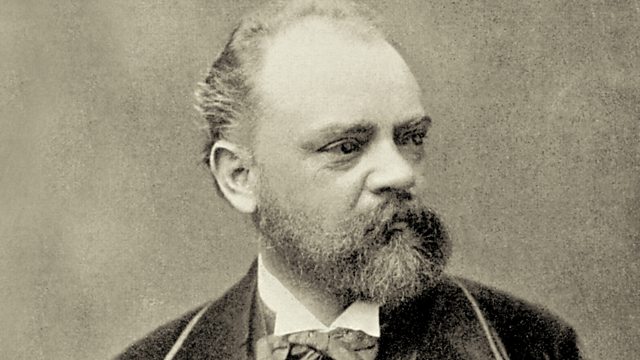
Bohemian Variations
Donald Macleod focuses on two completely contrasting, yet pivotal, works: Dvorak's Stabat Mater and Moravian Duets. Plus the Symphonic Variations.
Donald Macleod explores two completely contrasting, yet pivotal, works - Dvorak's Stabat Mater and Moravian Duets. Plus, a rare gem: his Symphonic Variations.
Long before the famous journey to the New World, the celebrated visits to this country, before even the great shaggy beard...there was once a young composer, obsessed with Wagner, scratching out a meagre living in obscurity in Prague - waiting patiently to snatch his moment as the most outstanding and distinctive musical voice his nation had ever heard. This week, Donald Macleod explores the critical period in the late 1870s when Antonin Dvorak first made his name, drawing musically from no fewer than four of Dvorak's early symphonies, his Piano and Violin Concertos, his much-loved Slavonic Dances, his String Quintet in G, and host of stage and chamber works.
Amidst the growing professional fame of the late 1870s, there was tragedy in Dvorak's family life as he lost the first three of his children to be born. A proud family man and deeply religious soul, Dvorak poured his grief into his much-loved Stabat Mater - a work that would later make his name in Great Britain. Meanwhile, a set of delightful Moravian Duets set tongues wagging in Germany - and won him a Berlin publisher. Could the man from the so-called "backwater" of Bohemia be set for his biggest break?
Quis est homo qui non fleret (Stabat Mater)
Ilse Eerens, soprano
Michaela Selinger, alto
Maximilian Schmitt, tenor
Florian Boesch, bass
Collegium Vocale Gent
Royal Flemish Philharmonic Orchestra
Philippe Herreweghe, conductor
Five Moravian Duets, Op 29
Elisabeth Schwarzkopf, soprano
Irmgard Seefried, contralto
Gerald Moore, piano
Symphonic Variations
Baltimore Symphony Orchestra
Marin Alsop, conductor
Piano Concerto in G minor, Op 33 (2nd mvt)
Stephen Hough, piano
City of Birmingham Symphony Orchestra
Andris Nelsons, conductor.
Last on
More episodes
Music Played
-
![]()
Antonín Dvořák
Stabat Mater Op 58 - Quis est homo
Choir: Collegium Vocale Gent. Orchestra: Antwerp Symphony Orchestra. Conductor: Philippe Herreweghe.- OUTHERE : LPH-009.
- OUTHERE.
- 1.
-
![]()
Antonín Dvořák
Stabat Mater Op 58 - Quis est homo
Choir: Collegium Vocale Gent. Orchestra: Antwerp Symphony Orchestra. Conductor: Philippe Herreweghe.- OUTHERE : LPH-009.
- OUTHERE.
- 1.
-
![]()
Antonín Dvořák
4 Partsongs Op 29
Performer: Gerald Moore. Singer: Elisabeth Schwarzkopf. Singer: Irmgard Seefried.- EMI: CDH7697932.
- EMI.
- 9.
-
![]()
Antonín Dvořák
Symphonic Variations Op 78
Orchestra: Baltimore S O. Conductor: Marin Alsop.- NAXOS : 8.-570714.
- NAXOS.
- 1.
-
![]()
Antonín Dvořák
Concerto in G minor Op 33 - Andante sostenuto
Performer: Sir Stephen Hough. Orchestra: City of Birmingham Symphony Orchestra. Conductor: Andris Nelsons.- Hyperion CDA68099.
- Hyperion.
- 1.
Broadcasts
- Wed 12 Apr 2017 12:00����ý Radio 3
- Wed 12 Apr 2017 18:30����ý Radio 3
- Wed 27 Jun 2018 12:00����ý Radio 3
Beethoven Unleashed – the box set
What was really wrong with Beethoven?
Composers A to Z
Who knew? Five eye-opening stories from Composer of the Week
Five reasons why we love Parry's Jerusalem
What is the strange power of Jerusalem which makes strong men weep?
A man out of time – why Parry's music and ideas were at odds with his image...
The composer of Jerusalem was very far from the conservative figure his image suggests.
Composer Help Page
Find resources and contacts for composers from within the classical music industry.





